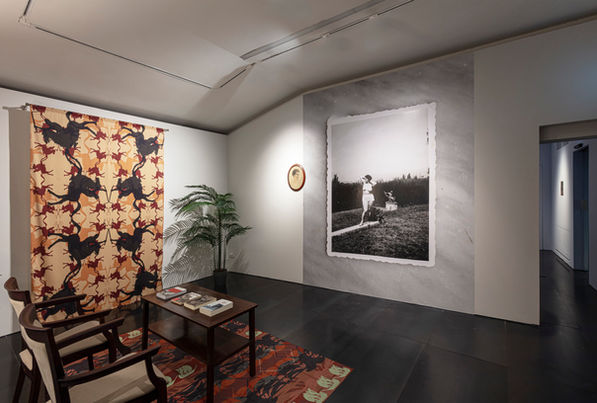Unsettling Genealogies
video installation, 2024 + performance lecture, 2024


Unsettling Genealogies emerges from Alessandra Ferrini’s long-term critical investigation into the history of Italian cultural institutions. It interweaves a series of family stories with a scrutiny of colonial history, social class, European imperialism, and Fascist legacies. Particularly, the work considers the cultural politics of Italian Fascism and its lasting investment in the arts, to highlight the relationship between aesthetics, ideology, and propaganda.
Unsettling Genealogies takes as its starting point a photograph depicting Giuseppe Volpi Count of Misrata, an Italian entrepreneur and politician, at the opening of the Third Venice International Film Festival held in 1935. In this edition of the festival, the Volpi Cup was introduced. Awarded to the best actress and actor, it was named after the Count of Misrata, then president of the Venice Biennale and a leading figure of the Fascist National Party, who had also served as finance minister for Mussolini. Volpi also held a significant role in the violent repression of the anticolonial resistance in Libya, which led to the genocide of the Senussi order in the late 1920s. The Volpi Cup is still awarded today, despite bearing the name of an Italian Fascist politician.
This archival image triggered a series of reflections on both the establishment of the Venice International Film Festival, founded by Volpi Count of Misrata, Antonio Maraini and Luciano De Feo in 1932, as well as on Maraini’s and Volpi's management of the Venice Art Bienniale during the Fascist regime. Antonio Maraini, a sculptor and politician, was the director of the Venice Art Biennale between 1928 and 1942. Three members of Ferrini’s family, her great-great-aunt, grandmother, and grandfather worked for Maraini’s estate in Florence during the 1930s and 1940s, as service personnel. Through personal and historical archives, Ferrini uncovers minor personal histories alongside forgotten or repressed historical narratives by staging a tension between the public and the domestic spheres. To emphasise this relation between individual and collective memory, the video was shot within an installation consisting of two rooms, both inspired by the archival photograph of the inauguration of the Venice Film Festval: one recalls a domestic space, while the other one features large reproductions of archival images of institutional spaces.
Exhibition curated by Daphne Vitali
at Museo Novecento, Florence.
Installation photographs by Serge Domingie.
Music by Marco Baldini,
camera work by Simone Petracchi,
audio mixing by Francesco Toninelli.
The performance-lecture based on this project was developed and produced thanks to the Live Works Fellowship vol.11 at Centrale Fies, curated by Barbara Boninsegna and Simone Frangi.
It was performed in July 2024.
See below for a teaser of the performance.













